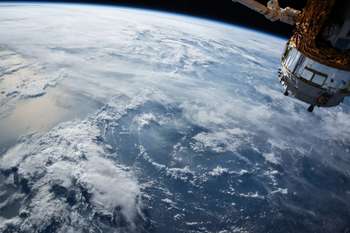Horizon - Work programme 2018-2020 per ricerca spaziale
 Pubblicati i nuovi bandi Horizon 2020 per la ricerca spaziale.
Pubblicati i nuovi bandi Horizon 2020 per la ricerca spaziale.
> Horizon - Work programme 2018-2020 per infrastrutture ricerca
> Horizon - Work programme 2018-2020 per Europa inclusiva
La Commissione Ue ha pubblicato il work programme 2018-2020 definitivo per il settore spaziale nell'ambito del programma europeo per la ricerca e l'innovazione Horizon 2020.
Le risorse a disposizione ammontano a oltre 615 milioni di euro.
> Scopri il programma Ue per ricerca e innovazione Horizon 2020
Work programme Horizon 2018-2020
Il work programme intende sostenere la ricerca spaziale allo scopo di sviluppare nuove tecnologie ed infrastrutture che aiuteranno l'Europa ad affrontare le principali sfide globali, tra cui il cambiamento climatico e la sicurezza energetica.
Nello specifico, il programma di lavoro supporterà l'evoluzione degli interventi europei per l'osservazione satellitare della Terra (Copernicus) e la navigazione satellitare (Galileo/EGNOS), oltre a sostenere l'imprenditoria, le tecnologie spaziali e la ricerca scientifica.
Quali bandi sono finanziati
Il work programme prevede due call articolate in vari argomenti (topic):
Primo bando: Call - Space 2018-2020
Il primo bando è dedicato all'osservazione terrestre, alla sicurezza, allo sviluppo di nuove tecnologie spaziali e di nuove imprese.
Sono pertanto finanziati progetti che promuovono l'evoluzione del programma europeo per l'osservazione satellitare della Terra, Copernicus - con interventi a supporto anche delle startup - e lo sviluppo di tecnologie innovative.
Earth observation
- DT-SPACE-01-EO-2018-2020: Copernicus market uptake
- LC-SPACE-02-EO-2018: Copernicus evolution – Mission exploitation concepts
- LC-SPACE-03-EO-2018: Copernicus evolution - Preparing for the next generation of Copernicus Marine Service ocean models
- LC-SPACE-04-EO-2019-2020: Copernicus evolution – Research activities in support of cross-cutting applications between Copernicus services
- LC-SPACE-05-EO-2019: Copernicus evolution – Research activities in support to a European operational monitoring system for fossil CO2 emissions
- DT-SPACE-06-EO-2019: International Cooperation Copernicus – Designing EO downstream applications with international partners
Space business, entrepreneurship, outreach and education
- DT-SPACE-07-BIZ-2018: Space hubs for Copernicus
- DT-SPACE-08-BIZ-2018: Space outreach and education
- DT-SPACE-09-BIZ-2019: Space hubs (support to start-ups)
Space technologies, science and exploration
- SPACE-10-TEC-2018-2020: Technologies for European non-dependence and competitiveness
- SPACE-11-TEC-2018: Generic space technologies
- SPACE-12-TEC-2018: SRC – Space robotics technologies
- SPACE-13-TEC-2019: SRC – In-Space electrical propulsion and station keeping
- LC-SPACE-14-TEC-2018-2019: Earth observation technologies
- SPACE-15-TEC-2018: Satellite communication technologies
- SPACE-16-TEC-2018: Access to space
- SPACE-17-TEC-2019: Access to space
- SPACE-18-TEC-2019-2020: In-orbit validation/demonstration – Mission design, integration and implementation
- SPACE-20-SCI-2018: Scientific instrumentation and technologies enabling space science and exploration
Secure and safe space environment
- SU-SPACE-22-SEC-2019: Space Weather
Secondo bando: Call - EGNSS market uptake 2019-2020
Il secondo bando finanzia applicazioni innovative del sistema europeo di posizionamento e navigazione satellitare civile (Galileo) e del sistema geostazionario europeo di navigazione di sovrapposizione (Egnos) da inserire sul mercato.
- LC-SPACE-EGNSS-1-2019-2020: EGNSS applications fostering green, safe and smart mobility
- DT-SPACE-EGNSS-2-2019-2020: EGNSS applications fostering digitisation
- SU-SPACE-EGNSS-3-2019-2020: EGNSS applications fostering societal resilience and protecting the environment
- SPACE-EGNSS-4-2019: Awareness Raising and capacity building
Il documento contiene anche gli elenchi dei possibili bandi per il 2020.
Scadenze
Sono previste diverse scadenze per la presentazione delle domande:
Primo bando: Call - Space 2018-2020
Earth observation
- DT-SPACE-01-EO-2018-2020: Copernicus market uptake: dal 31 ottobre 2017 al 6 marzo 2018;
- LC-SPACE-02-EO-2018: Copernicus evolution – Mission exploitation concepts: dal 31 ottobre 2017 al 6 marzo 2018;
- LC-SPACE-03-EO-2018: Copernicus evolution - Preparing for the next generation of Copernicus Marine Service ocean models: dal 31 ottobre 2017 al 6 marzo 2018;
- LC-SPACE-04-EO-2019-2020: Copernicus evolution – Research activities in support of cross-cutting applications between Copernicus services: dal 16 ottobre 2018 al 12 marzo 2019;
- LC-SPACE-05-EO-2019: Copernicus evolution – Research activities in support to a European operational monitoring system for fossil CO2 emissions: dal 16 ottobre 2018 al 12 marzo 2019;
- DT-SPACE-06-EO-2019: International Cooperation Copernicus – Designing EO downstream applications with international partnersdal: dal 16 ottobre 2018 al 12 marzo 2019;
Space business, entrepreneurship, outreach and education
- DT-SPACE-07-BIZ-2018: Space hubs for Copernicus: dal 31 ottobre 2017 al 6 marzo 2018;
- DT-SPACE-08-BIZ-2018: Space outreach and education: dal 31 ottobre 2017 al 6 marzo 2018;
- DT-SPACE-09-BIZ-2019: Space hubs (support to start-ups): dal 16 ottobre 2018 al 12 marzo 2019;
Space technologies, science and exploration
- SPACE-10-TEC-2018-2020: Technologies for European non-dependence and competitiveness: dal 31 ottobre 2017 al 6 marzo 2018; dal 16 ottobre 2018 al 12 marzo 2019; 16 ottobre 2018 al 12 marzo 2019;
- SPACE-11-TEC-2018: Generic space technologies: dal 31 ottobre 2017 al 6 marzo 2018;
- SPACE-12-TEC-2018: SRC – Space robotics technologies: dal 31 ottobre 2017 al 6 marzo 2018;
- SPACE-13-TEC-2019: SRC – In-Space electrical propulsion and station keeping: dal 16 ottobre 2018 al 12 marzo 2019;
- LC-SPACE-14-TEC-2018-2019: Earth observation technologies: dal 31 ottobre 2017 al 6 marzo 2018; dal 16 ottobre 2018 al 12 marzo 2019;
- SPACE-15-TEC-2018: Satellite communication technologies: dal 31 ottobre 2017 al 6 marzo 2018;
- SPACE-16-TEC-2018: Access to space: dal 31 ottobre 2017 al 6 marzo 2018;
- SPACE-17-TEC-2019: Access to space: dal 16 ottobre 2018 al 12 marzo 2019;
- SPACE-18-TEC-2019-2020: In-orbit validation/demonstration – Mission design, integration and implementation: dal 16 ottobre 2018 al 12 marzo 2019;
- SPACE-20-SCI-2018: Scientific instrumentation and technologies enabling space science and exploration: dal 31 ottobre 2017 al 6 marzo 2018;
Secure and safe space environment
- SU-SPACE-22-SEC-2019: Space Weather: dal 16 ottobre 2018 al 12 marzo 2019;
Secondo bando: Call - EGNSS market uptake 2019-2020
- LC-SPACE-EGNSS-1-2019-2020: EGNSS applications fostering green, safe and smart mobility: dal 16 ottobre 2018 al 5 marzo 2019;
- DT-SPACE-EGNSS-2-2019-2020: EGNSS applications fostering digitisation: dal 16 ottobre 2018 al 5 marzo 2019;
- SU-SPACE-EGNSS-3-2019-2020: EGNSS applications fostering societal resilience and protecting the environment: dal 16 ottobre 2018 al 5 marzo 2019;
- SPACE-EGNSS-4-2019: Awareness Raising and capacity building: dal 16 ottobre 2018 al 5 marzo 2019;
Le scadenze per i bandi 2020 devono ancora essere definite.
> Programma di lavoro 2018-2020
Photo credit: Foter.com
o


